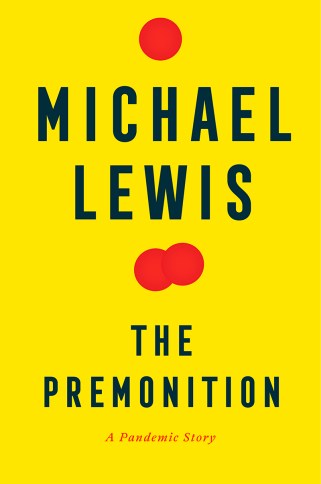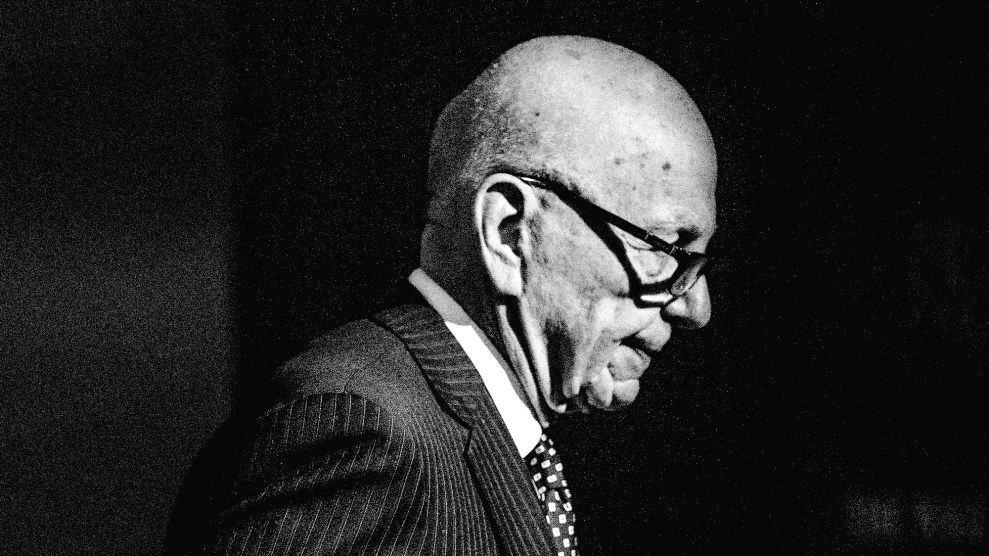
Michael Lewis in the pre-pandemic days.Tabitha Soren
Fans of the best-selling author Michael Lewis know that his nonfiction books often spring from a deceptively simple question whose pursuit manages to unearth incredible characters and stories. In The Fifth Risk, published in 2018, he basically asks: “What are the essential, even existential, things our federal government does—and what happens when someone comes into power who couldn’t care less?” Years earlier, in Moneyball, Lewis asked how the Oakland Athletics, one of the poorest teams in Major League Baseball, could so reliably make it to the playoffs. That book ended up transforming how MLB teams are managed and players recruited.

One can only hope for a similar impact from his latest, The Premonition: A Pandemic Story. The underlying question here is how the wealthiest and best-resourced nation on the planet could end up with the most COVID-19 deaths. The official count is approaching 600,000, but the true number is much higher. One recent analysis from the University of Washington estimates that the pandemic is responsible for the demise of more than 905,000 Americans.
Lewis tells his story, as always, through a small cast of riveting characters. Not the politicians we see jabbering on TV, but the folks you typically find many floors below the executive suite—in this case, intrepid doctors and scientists and public health officials who battle institutional apathy and herd mentality as they do everything in their power to keep a burgeoning pandemic in check. Lewis’ characters were born for this task, if only the talking heads upstairs would pay attention.
The Premonition follows naturally from The Fifth Risk, although with “some curves in between,” Lewis says in an interview. The latter book began taking shape around the time of Donald Trump’s inauguration in January 2017, as Lewis watched footage of the Trumps walking up to meet the Obamas on the White House steps. “I had just had hip surgery and I was drugged up on opioids. And this thought crossed my mind: How’s [Trump] going to kill me?” Lewis recalls. “Because I’m thinking of the federal government as a manager of risk. And his attitude toward the whole project is something between hostility and indifference, and this is not going to end anywhere good.”
For several years, Trump got incredibly lucky, Lewis says: “He kind of skated along, and his ineptitude didn’t get revealed in as dramatic a way as it might have. Then all of a sudden, this happens. At that moment, I had an almost professional obligation to follow the story to the end.”
But as of March 2020, “I didn’t actually have a story, or conviction to call my publisher and say I’m doing a pandemic book. Because I didn’t know how to do it!” He needed a narrative, which meant finding the right characters. He’d already been following Joe DiRisi, a University of California, San Francisco, biochemist whose brilliance is usurped only by his creativity and DIY spirit. He later met Carter Mecher, a Veteran’s Administration doctor and pandemic savant whose true gift was his ability to identify and unravel vexing institutional problems. These characters pointed him to Charity Dean, a firecracker of a county public health officer who had risen to the No. 2 job in the California state health department.
Each of these star characters “occupied a different place in the pandemic-industrial complex,” and when stitched together, their stories painted a portrait of the system and its dysfunction, Lewis says. “I basically took a flying leap. I became so interested in the characters, I just said I’ll trust them to get me through the story.” And they do. This trio, along with various side characters, are the conduit for this quasi-novelistic tale of curiosity, bravery, heroism, and government dysfunction, with potent lessons for the remainder of this pandemic—and the next one, and the next.
Lewis had imagined his new book would be a deep dive into the pathology of the Trump administration. Yet the problem, he quickly came to realize, went well beyond Trump. Yes, Trump was inept and late to respond, and his team fumbled quite badly, but “it isn’t that Donald Trump is taking this exquisitely tuned, polished machine and destroying it. He’s taking this machine that we’ve allowed to gather rust for more than a generation and taken a sledgehammer to it.” Instead, The Premonition became more a story about the consequences of “our failure to preserve the strength of our institutions.”
Spoiler alert: Those institutions don’t end up looking too good. When Lewis approached California’s health department to interview Charity Dean, for example, he was told she wasn’t interested. “That was a lie. They never told her about it!” he says. “I finally got her cell phone number and texted her and she said, ‘What? You’ve been trying to reach me?’ And from there a character was born.”
Obstruction to his characters’ heroic efforts by timorous political entities, including the Centers for Disease Control and Prevention, is a recurring theme. For where The Fifth Risk felt in some ways an appreciation of government, The Premonition is an indictment of a gutless bureaucratic state. Government is an impediment to progress “because of the way we’ve treated government for so long…It doesn’t do novelty well. It doesn’t innovate fast.”
And yet, it has the means. “You could have, inside the California state government, or inside the US government, someone who is exquisitely suited to running the pandemic response, and the government would never find them!” Lewis says. He learned from Todd Park, an entrepreneur who served as chief technology officer during the Obama administration, that in any large organization, there’s invariably an L6—”someone six levels down, and no one knows they exist,” who is perfectly equipped to tackle a given crisis.
“That was a shock to me,” Lewis says. “That Charity Dean was transparently, obviously the most intellectually and psychologically suited” person to lead California’s crisis response, yet she was actually barred from meetings discussing the pandemic. Her politically minded boss even ordered her, in January 2020, to quit using the word ‘pandemic’ in communications, even though Dean knew what was coming.
For a status-conscious executive, Lewis says, awareness of the L6 phenomenon can be liberating. “If you’re a gifted manager, the first thing you do is try to find that L6. And you’ve got to give it to Gavin Newsom—he brought in people from outside who could shake up the status structure of the institution and find Charity. He didn’t do it until the end of March. It would have been nice if he did it in mid-January. But he did it.”
But characters like Dean find themselves in impossible situations. A local public health officer who makes the best of decisions—the ones that save lives—can still get run out of town on a rail: “All the social and political risk, and a little bit of infectious risk associated with managing communicable disease, has been shoved down on them,” Lewis told me.
Prior to the pandemic, as chief health officer for Santa Barbara County, Dean was dealing with multidrug-resistant tuberculosis, hepatitis C clusters, and meningitis scares—unlike many of her peers, she was willing to make the unpopular calls required. “But she didn’t have the social power, really, to fight,” Lewis says. “No one knew who she was. She was poorly paid. She was abysmally resourced. Charity’s mantra after a couple of years was, ‘No one is coming to save me. Not only am I on my own, but if I make a misstep, I’m likely to lose my job and be disgraced. On the other hand, I’m on my own! The only upside in this job is the private knowledge that I saved someone’s life by stopping diseases.’”
The CDC was more of a bother than a help. In books such as Laurie Garrett’s The Coming Plague and Randy Shilts’s And the Band Played On, I vaguely recall the CDC being a heroic agency, with teams of disease cowboys parachuting into hot zones and solving epidemiological mysteries. But as depicted in The Premonition, the CDC is an opaque, meddlesome bureaucracy, more concerned with covering its ass than stopping a pandemic. “I was so disappointed,” noted Dean, who had also held the CDC in high regard, “that the man behind the curtain turned out to be such a pansy.”
These days, Lewis says, the CDC “backs away from controversy, avoids doing things that are all unpopular, waits until they’ve got total certainty about some disease so they can write a paper about it rather than intervene when you can actually save lives.”
What happened to this respected institution? Lewis’ take, informed by his chats with CDC “old timers,” is that the agency earned its solid reputation by eliminating smallpox in the ’60s and ’70s. Prior to the mid-1980s, the agency was run by veteran public servants—scientists recruited from within—not political appointees. But in 1976, a swine flu outbreak at a New Jersey military base sickened some soldiers and killed one. The nation’s health experts agreed this was a catastrophe in the making—the public lacked immunity and a deadly new flu strain could devastate the population. So they decided to vaccinate everyone. “It’s a very sound decision, but it turns out to be the wrong decision,” Lewis explains. The pandemic never materialized and some people actually died from the vaccine. Longtime CDC chief David Sencer was “fired, disgraced, descends into alcoholism—his children say he was never the same again.”
Under Ronald Reagan’s watch, the White House meddled in the CDC’s affairs and second-guessed its experts to such an extent that the new chief, a veteran public servant named Bill Foege, tendered his resignation. The administration seized the opportunity to convert the CDC’s top posts into political positions. “It seems like no big deal—civil servant, political appointee—but in fact, I think it has pretty profound consequences,” Lewis says. Not only are you recruiting from a much smaller and more ideological pool, but “you eliminate the possibility of long-term leadership. And the incentives are different for someone who’s there for a short time. It’s the difference between a renter and a homeowner…Look at former CDC director Robert Redfield vs Tony Fauci, a career civil servant. Trump wanted to fire Fauci. Wanted to twist him around his little finger. And he couldn’t!”
To control a pandemic, health officials require the independence to be able to make politically unpopular decisions—decisions that could be wrong, because you have to base them on what you think the situation will look like weeks or months in the future. “You could look like an idiot, even if you’re doing it just as you should be,” Lewis says. “And that decision is really hard, in this environment, for a political operation to make.”
Would America’s drama have played out differently had the Biden administration been in charge from the outset? “It’d have been better. Hundreds of thousands of Americans might still be alive,” Lewis says. “But you would have still had this problem of the CDC preferring a sin of omission to a sin of commission. You still would have the problem of stitching together a unified response. And you’d have the wicked problem that the government would have needed to act pretty fiercely before the disease was moving at speed around the communities. Maybe that would have happened, but it seems unlikely.”
“So I would bet that we act a little sooner, but not as soon as we should. We are better organized, but not as organized as we should be. We don’t have 20 percent of the world’s deaths; we have something like 8 percent,” he says, and “there’s this other devilish problem: that some part of the country thinks there’s a line in the Constitution that says you’re allowed to infect anybody you want with a deadly disease. I keep going through the Constitution, and I can’t find that line!”
That is indeed a problem. Lacking a common enemy, as Lewis points out, we have found the enemy within. America’s “us vs them” dynamic is powerful, he says, but “if you double or triple the lethality of this virus, and it’s equally lethal in young people as it is an old people, I bet you’d cut right through the noise on cable television. And you’d generate a unified response because people are terrified.” To bring us together, “something has to happen that scares the shit out of people.”
The COVID pandemic, though not yet over, actually has left Lewis with a modicum of hope—”the same sort of hope I have for an alcoholic friend who I think is going to stop drinking,” he says. “My feeling is that enough people were touched by tragedy to have shifted enough opinion to enable the Biden administration to start thinking about structural change. Biden has been able to talk about government in a way that even Obama wasn’t, and there seems to be more of a willingness to offer a full-throated defense of—sale of—government than there’s been in a very long time.”
As Lewis pointed out in The Fifth Risk, some federal agencies—the National Weather Service is one example—are actually forbidden by law from spending money to inform the public about what they do. But imagine, he says, if the federal government were as self-promoting as Donald Trump. The public might have a far more favorable view of the government and its importance in their lives. Yet while Lewis senses progress in that realm, “I’m watching on pins and needles, because if there’s any serious misstep on the order of [Obamacare portal] Health.gov crashing on the first day—if there’s any whiff of deep incompetency, the other side is going to jump all over it as an excuse” to again try to portray the federal government as an enemy of the people.
“And that’s a very easy sell,” he adds. “That’s what worries me.”









